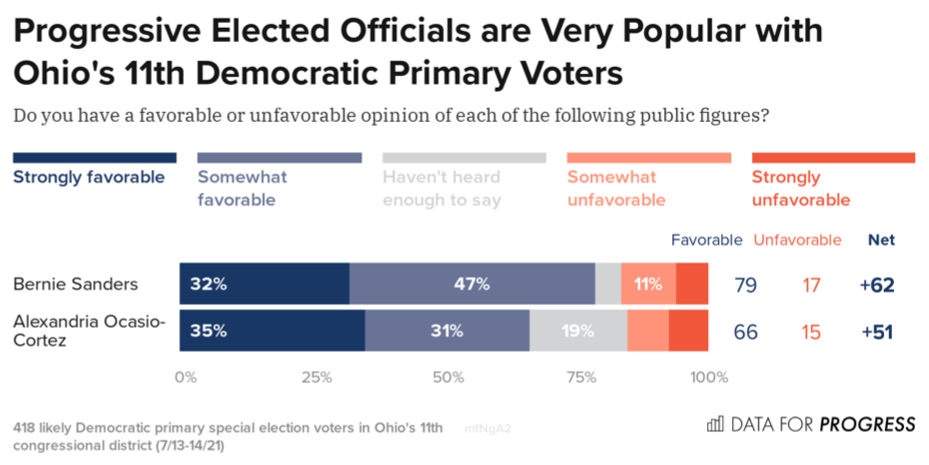The Data's In On The Nina Turner-Shontel Brown Race
- Howie Klein

- Aug 15, 2021
- 3 min read

There are lots of opinions about why Nina Turner lost the OH-11 special election primary. I've written a couple myself-- here and, more recently, here. I want to share a memo, dated August 11, from the progressive polling firm Data For Progress.
Data For Progress conducted two independent polls of likely Democratic primary voters, one from July 13 to 14th and the other from July 30th to August 1st leading up to the August 3rd Special election. They saw "a steady increase in support for [Shontel] Brown, ultimately leading to her victory over Turner on election day."
Were the voters rejecting the broad progressive platform that Nina was running on, in favor of the status quo that Brown ran on? Data for Progress' analysis rejected that and points directly to the sewer money that flooded into the district in the last 2 weeks of the campaign. "The Green New Deal, Medicare for All and the $15 minimum wage all have overwhelming support of the voters in the district," they wrote. "Senator Sanders and Representative Alexandria Ocasio-Cortez are viewed favorably in the district, at +62 and +51 net favorability, respectively."

"Ohio’s 11th District was a prime opportunity to send a champion to Congress who would be able to fight for key progressive priorities like a $15 minimum wage, a Green New Deal and Medicare for All. Nina Turner was not too left for the district, in fact, she was the candidate who aligned best with her prospective constituents. Primary voters in OH-11 supported these three key progressive priorities by huge margins. We can conclusively say it wasn’t Turner’s stances on the issues that lead to her narrow defeat." They noted that Brown’s website touted the kind of passive support of all three priorities that establishment status quo Democrats use to trick voters into thinking they will fight for progressive issues-- things like "a path to a $15 minimum wage" or "I support the principles laid out in the Green New Deal" and worst yet, "I would vote for Medicare for All if it came to the House floor," clearly showin-- like most rotgut conservative Democrats, she has no intention of fighting to bring it to the floor.

"Two of these three issues-- a $15 Minimum Wage and Medicare for All-- were also polled with a separate group of voters weeks later, after the barrage of outside spending, where we saw no difference in support for these policies."

Furthermore, we found that national movement leaders like Senator Bernie Sanders and Congresswoman Alexandria Ocasio-Cortez are viewed favorably by the vast majority of primary voters in the district. They aren’t as popular as the issues, which is common to see, but they are still very popular, at +62 and +51 net favorability respectively.
Outside Spending
Outside groups can’t control what a campaign is ultimately going to do with their budget, but they do have control over their Independent Expenditures-- and there is no denying that the negative ads against Nina Turner, especially at the end, came out very strong with significant money behind them. Notably, unlike Turner, Brown was able to withhold much negative advertising against her opponent as it was taken care of by outside groups.

Voters also reported seeing more ads against Turner than they did with Brown.

Change In The Race
Following the barrage of negative hits on Turner, we saw a considerable drop in her favorability ratings-- from +29 percentage points, down to +1 percentage point. Brown started at 16% unfavorable in our first poll and moved to 32%, while Turner started at 28% unfavorable and moved up to 46%.

... Conclusion
Based on our polling, we believe Turner’s loss in Ohio’s 11th was not rejection of progressive policies or a progressive platform at large, but rather a result of letting negative advertisements define her leading to a significant decrease in her net favorability just before the election.
Ohio’s 11th shows that progressives must build our capacity to match moderate outside spending dollar-for-dollar on digital, radio and especially television. While field can make a difference in a very tight race, SuperPAC spending cannot be matched with door-knocking alone. We must avoid shallow narratives about ad spending-- television ads work, and it’s time to get serious about building up our capacity to compete. There is nothing progressive about losing an election because we are not matching outside spending on radio, digital and television.





So... bottom line... it was voters?
the problem is solved by spending a shit-ton of money to make a bunch of colossal idiots do the right thing and vote for their issues?
..um... okay.
It was an OPEN PRIMARY where Republicans "helped" the Dems choose the Dems' candidate. That's how Brown won.